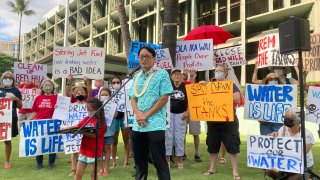
Citing threats to Honolulu's drinking water, the Sierra Club of Hawaii and other groups on Wednesday called on President Joe Biden and military leaders to shut down tanks that provide an important fuel reserve for U.S. forces in the Pacific.
“Enough is enough. We've lost all faith in the local Navy command,” said Wayne Tanaka, the director of the Sierra Club of Hawaii, at a rally and news conference.
The military built 20 fuel tanks, each the equivalent of 25 stories tall, during World War II near Pearl Harbor on top of an aquifer that supplies drinking water to one-quarter of Honolulu.
The call to shut them down comes after a series of recent revelations about fuel leaks associated with the Red Hill fuel tanks or Pearl Harbor.
Get top local stories in Philly delivered to you every morning. Sign up for NBC Philadelphia's News Headlines newsletter.
Tanaka called the tanks “an unacceptable threat to the drinking water supply for 400,000 Oahu residents.”
Navy Region Hawaii said in a statement that it is committed to safeguarding the environment and drinking water while protecting national security.
“We will closely monitor all aspects of the Red Hill Bulk Fuel Storage Facility to ensure the safety of our operations,” it said.
U.S. & World
Stories that affect your life across the U.S. and around the world.
On Monday, the Navy said 14,000 gallons (52,995 liters) of a water and fuel mixture leaked into the Red Hill facility’s lower tunnel from a fire suppression system drain line. No fuel leaked into the environment.
Last month, Honolulu Civil Beat reported that officials waited months to report a January leak at Pearl Harbor to the state Department of Health “amid concerns it would hamper its ability to secure a state permit” for the Red Hill tanks.
Hawaii’s four-member congressional delegation has asked the Department of Defense’s inspector general to investigate the January leak, saying they want to know whether the Navy properly investigated and notified state authorities.
The state health department last month fined the Navy more than $325,000 for Red Hill operations and maintenance violations.
A 2014 fuel leak prompted the Navy to sign an agreement with the U.S. Environmental Protection Agency and the state Health Department to upgrade the tanks and better prevent and detect leaks.



